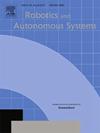Robust adaptive control for aggressive quadrotor maneuvers via SO(3) and backstepping techniques
IF 4.3
2区 计算机科学
Q1 AUTOMATION & CONTROL SYSTEMS
引用次数: 0
Abstract
For decades, a number of nonlinear control methodologies such as backstepping control and model predictive control have been studied to guarantee the stability and performance of systems under control. Most of these designs were based on local coordinates like Euler angles or quaternions, coming with inherent limitations such as singularities and unwinding phenomena, thereby hindering practical applications where large angle rotational maneuvers are commanded. In this paper, we propose a novel adaptive geometric tracking controller based on the logarithmic map of , the special orthogonal group, for aggressive maneuvers of a quadrotor subject to uncertain mass and inertia matrix. By directly synthesizing control laws on , issues raised by local coordinates can be circumvented. Furthermore, we provide theoretical proofs establishing asymptotic tracking and the boundedness of all signals in the closed-loop system. We enhance robustness by applying projection operators to adaptive laws, addressing nonparametric uncertainties like sensor noise. Through simulation, our proposed controller outperforms prior geometric controllers in tracking aggressive trajectories, particularly excelling in the face of uncertainties.
求助全文
约1分钟内获得全文
求助全文
来源期刊

Robotics and Autonomous Systems
工程技术-机器人学
CiteScore
9.00
自引率
7.00%
发文量
164
审稿时长
4.5 months
期刊介绍:
Robotics and Autonomous Systems will carry articles describing fundamental developments in the field of robotics, with special emphasis on autonomous systems. An important goal of this journal is to extend the state of the art in both symbolic and sensory based robot control and learning in the context of autonomous systems.
Robotics and Autonomous Systems will carry articles on the theoretical, computational and experimental aspects of autonomous systems, or modules of such systems.
 求助内容:
求助内容: 应助结果提醒方式:
应助结果提醒方式:


